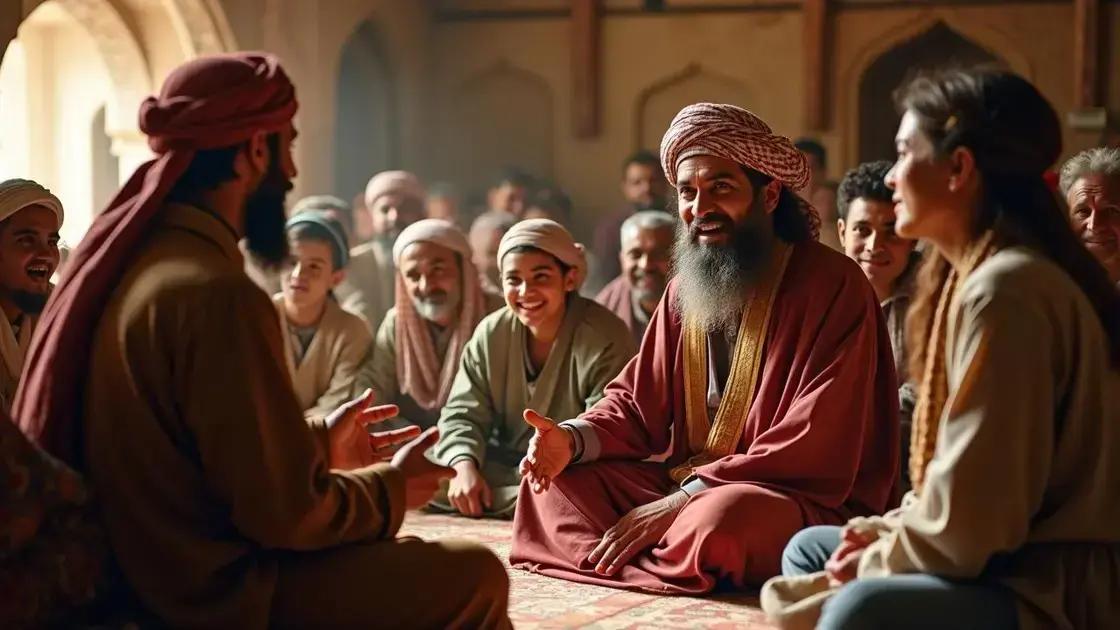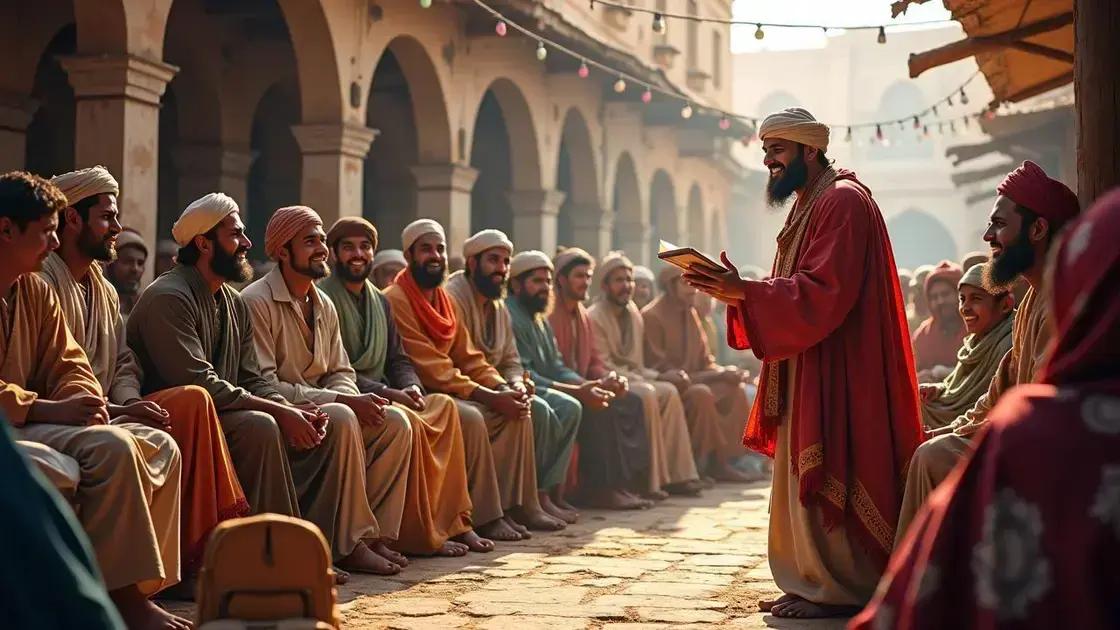The Arab Sheikh’s Trick is a clever narrative tradition within Arab culture that highlights themes of wit, morality, and social values, illustrated through famous tales like ‘The Clever Drunk’ and ‘The Stolen Camel.’ This storytelling represents a timeless educational tool, shaping cultural identity, providing social cohesion, and adapting to modern interpretations in literature, education, and business practices.
The Arab Sheikh’s Trick is a captivating narrative steeped in culture and intrigue. This historical trick merges cleverness with tradition, showcasing the rich tapestry of Arab folklore. In this article, we will uncover the origins of this fascinating trick, its cultural significance within Arab society, and delve into famous tales that have endured through generations. We will also explore modern interpretations and how these stories shape perceptions today.
Origins of the Arab Sheikh’s Trick

The Arab Sheikh’s Trick traces its roots to ancient storytelling traditions prevalent in the Middle East. These tales often featured clever tricksters using their wits and guile to outsmart others. The origin of this trick stems from a rich cultural heritage, where wisdom, intelligence, and, at times, deceit played crucial roles in both entertainment and everyday life.
Historical Context
The historical backdrop of the Arab Sheikh’s Trick lies in the vibrant, interactive storytelling sessions that marked community gatherings. Storytellers, known as hakawatis, would captivate audiences with their tales, engaging listeners by weaving together local lore and moral lessons. These stories often included characters like wise sheikhs, who used clever tricks to teach important life lessons, emphasizing intellect over brute strength.
Symbolism of the Trick
Symbolically, the Sheikh’s Trick represents more than mere deception; it reflects the Arab values of cunning, resourcefulness, and social commentary. In various tales, the trick serves as a medium to highlight societal issues, encouraging listeners to reflect on morality and justice.
Evolution Over Time
Over the years, as cultural exchanges occurred, the Arab Sheikh’s Trick evolved, absorbing influences from various traditions. Elements from Persian, Indian, and later Western literature enriched the trick’s narrative style, contributing to its lasting appeal and resonance in popular culture.
Today, the charm of the Arab Sheikh’s Trick continues to captivate audiences, reminding us of the timeless nature of storytelling and its power to convey profound truths about human behavior.
Cultural Significance in Arab Society

The cultural significance of the Arab Sheikh’s Trick extends beyond mere entertainment; it plays a vital role in shaping social values and community dynamics. In Arab society, storytelling is more than just a pastime; it is a means of preserving history, fostering resilience, and imparting wisdom. The Sheikh’s Trick becomes a vehicle for cultural expression, offering commentary on social norms and moral dilemmas faced by individuals.
Teaching Values
Through the lens of the Sheikh’s Trick, valuable lessons about honesty, cleverness, and the consequences of deceit emerge. These tales often involve a wise Sheikh who employs trickery, but usually, there is a moral takeaway, such as the importance of integrity and the value of wit in overcoming challenges. As a result, these stories are not only entertaining but also serve as educational tools within families and communities.
Social Cohesion
Additionally, such tricks foster social interaction and cohesion. The act of gathering to hear these tales strengthens bonds within communities, as family members and friends share laughter and amusement together. The trick’s humor often diffuses tensions and creates an atmosphere of unity among listeners, reinforcing social ties and cultural identity.
Preservation of Heritage
The Arab Sheikh’s Trick also represents a method of preserving heritage. This storytelling tradition has been passed down through generations, adapting to changing times while maintaining core values. As these tricks are told and retold, they contribute to a collective identity and remind individuals of their roots, connecting them to their ancestors and cultural heritage.
In essence, the cultural significance of the Arab Sheikh’s Trick lies in its ability to entertain, educate, and unite people, ensuring that important lessons and traditions continue to thrive in the present day.
Famous Tales and Anecdotes

Throughout history, the Arab Sheikh’s Trick has inspired numerous fascinating tales and anecdotes that showcase its cleverness and humor. Here are some of the most famous stories that illustrate the charm and wit embedded in these narratives.
The Clever Drunk
In one tale, a Sheikh encounters a drunk man who has lost his way. The drunkard, claiming to be a famous poet, engages the Sheikh in a battle of wits. To outsmart the Sheikh, the drunkard pretends to recite profound verses, which are, in fact, nonsensical. Amused, the Sheikh challenges him to a competition, declaring that the first to stop drinking loses. As the Sheikh is about to win, he discreetly pours his drink onto the ground, maintaining his composure while the drunk falls into a foolish trap.
The Stolen Camel
Another popular story involves a Sheikh who teaches a thief a valuable lesson. When a camel goes missing, the Sheikh suspects a notorious bandit. To catch the bandit, the Sheikh sets up a fake market selling ‘cheap’ camels. The bandit, eager for an easy target, arrives only to find himself outsmarted by the Sheikh’s tricks. The Sheikh compels him to return the stolen camel in exchange for his freedom, turning the tables and highlighting the consequences of bad decisions.
The Wise Daughter
In yet another tale, a Sheikh’s daughter is said to possess great intelligence and wit. Suitors line up to win her hand in marriage, but she devises a trick to test their cleverness. She sets impossible tasks, and the cleverest suitor completes them using trickery. The Sheikh, impressed with his daughter’s cunning, decides that the best match is the one who can outsmart not just the challenge but also the Sheikh himself, celebrating intellect over wealth or status.
These stories of the Arab Sheikh’s Trick not only entertain but also convey deeper meanings about human nature, cleverness, and morality, ensuring that these lessons resonate through time.
Modern Interpretations and Uses

In today’s world, the Arab Sheikh’s Trick continues to find relevance in various modern interpretations and uses, extending its influence beyond traditional storytelling. This continuity highlights the adaptability of classic tales in contemporary society.
Literature and Media
Modern literature often revisits themes from the Sheikh’s Trick, incorporating clever plots and unexpected twists. Popular novels and films draw inspiration from these tales, crafting stories that entertain while delivering messages of wit and cunning. This fusion of old and new helps to keep the essence of the Sheikh’s Trick alive while appealing to younger audiences.
Education and Teaching
Educators are also using the concept of the Sheikh’s Trick in classrooms to promote critical thinking and problem-solving skills. By presenting students with scenarios based on these traditional tales, teachers encourage learners to analyze situations, propose solutions, and understand the moral implications of their choices.
Online Culture
Additionally, the internet and social media have breathed new life into the Sheikh’s Trick. Memes and short videos often parody scenarios reminiscent of these tricks, illustrating clever tricks and humorous outcomes. This modern medium allows the wisdom of the Sheikh’s Trick to reach a broader audience, making it relevant in the digital age.
Business and Marketing Strategies
Even in business contexts, principles from the Sheikh’s Trick are applied in negotiation tactics and marketing strategies. Companies use clever marketing campaigns that reflect the same cleverness found in traditional tales, engaging consumers and drawing their attention through humor and wit.
As society evolves, the timeless essence of the Arab Sheikh’s Trick adapts, finding new ways to inspire, educate, and entertain through diverse channels and platforms.
The Enduring Legacy of the Arab Sheikh’s Trick
The Arab Sheikh’s Trick showcases the remarkable blend of humor, wisdom, and cultural significance that has transcended time and geography. Its origins rooted in ancient storytelling have evolved into modern interpretations, teaching valuable lessons about cleverness and morality.
Through famous tales, the trick highlights important social values, while its relevance today can be seen in literature, education, digital media, and business practices. As a versatile narrative, it continues to inspire and engage audiences across generations.
Ultimately, the Arab Sheikh’s Trick serves as a testament to the power of storytelling, reminding us of the cleverness inherent in human experience and the age-old wisdom that can still resonate today.
FAQ – Frequently Asked Questions about the Arab Sheikh’s Trick
What is the Arab Sheikh’s Trick?
The Arab Sheikh’s Trick refers to clever narratives featuring a Sheikh that emphasize wit, humor, and moral lessons in storytelling.
What are some famous tales associated with the Sheikh’s Trick?
Famous tales include clever stories such as ‘The Clever Drunk,’ ‘The Stolen Camel,’ and ‘The Wise Daughter,’ each highlighting intelligence and moral lessons.
How does the Sheikh’s Trick hold cultural significance in Arab society?
The Sheikh’s Trick is significant as it helps to preserve cultural identity, teaches values, fosters social cohesion, and maintains traditional storytelling practices.
How has the Arab Sheikh’s Trick been interpreted in modern media?
In modern media, it appears in literature, films, digital storytelling, and educational settings, adapting its themes to resonate with contemporary audiences.
What lessons can be learned from the Arab Sheikh’s Trick?
Lessons from the Sheikh’s Trick often include the importance of cleverness over brute strength, the consequences of deceit, and the values of integrity and morality.
Can the Arab Sheikh’s Trick be used in education?
Yes, educators use tales from the Sheikh’s Trick to encourage critical thinking and problem-solving skills in students through engaging storytelling.













